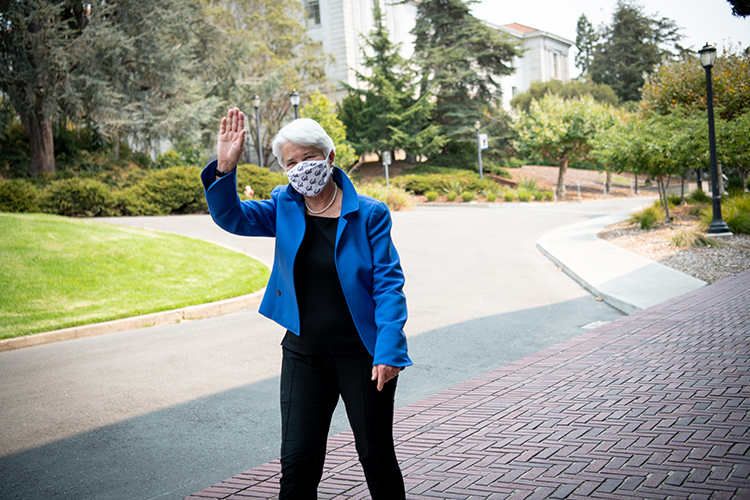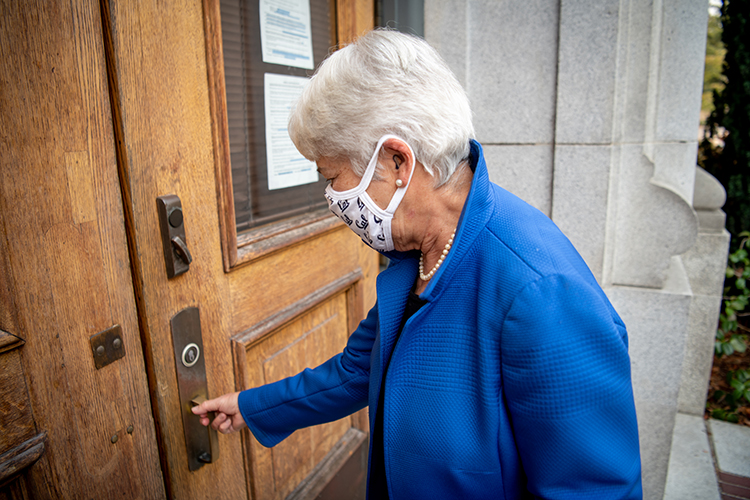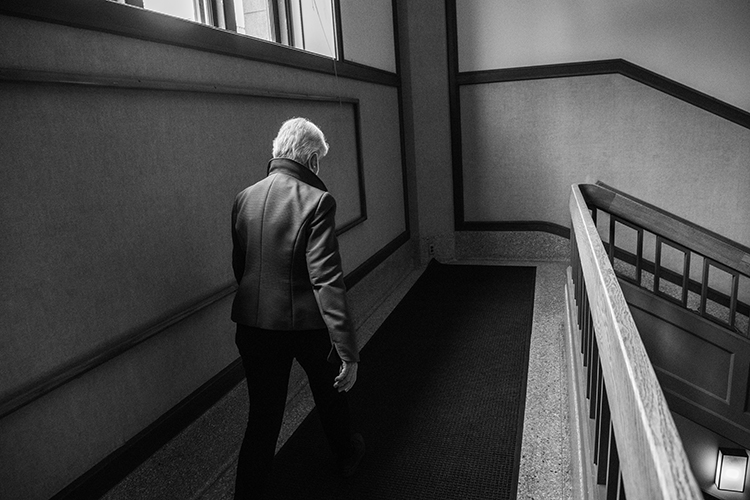Chancellor chat: Coronavirus pandemic can’t stop Berkeley or its mission
Teaching, research, public service, philanthropy persist as one of the toughest school years begins
August 26, 2020

“What we have been given is a unique set of opportunities arising from the most historic, consequential moment in our lives, and there is no place better than Berkeley to make the most of it,” Chancellor Christ told students at the start of fall semester 2020. (UC Berkeley photo by Keegan Houser)
It’s a new semester in so many ways at UC Berkeley. There’s a pandemic on the loose, worldwide, and most students, staff and faculty are working from home, out of safety. The arrival of COVID-19 also has caused a global financial crisis and intensified systemic racism; the campus is feeling the impact deeply.
But Chancellor Carol Christ, in a recent talk with Berkeley News, says this isn’t a season to despair. Like everyone else, she misses seeing and hearing the back-to-school bustle. But she said she can feel Berkeley’s strong heartbeat and ample evidence of its value, especially in times of crisis, to the country and the world. The campus may have been functioning virtually for the past five months, but it hasn’t wasted a minute advancing its mission of teaching, research and public service. Christ has seen the evidence, and calls it extraordinary.
Berkeley News: The start of the fall semester is something you’ve said you always look forward to — the sights, the sounds, the energy of the students. How have you experienced back-to-school time during a pandemic, and where instead are you finding evidence of that liveliness?
Chancellor Christ: Those are exactly the two parts of this experience that are so hard to hold together. I’m working in my office today, and even at this time of the morning, the campus is usually bustling with human energy, but it’s empty and eerie. I parked in the Dwinelle Lot, which is usually full when we’re not in a pandemic.
But there is so much virtual community. I just got done with an orientation session for new faculty, and it was such a treat to see their faces and hear about their research and about them beginning their Berkeley appointments. I’m meeting with lots of groups virtually — both outside and inside the university. So, there’s a huge amount going on, but it’s all virtual.

“At Berkeley, we are the changemakers,” said Chancellor Christ. (UC Berkeley photo by Keegan Houser)
I’m very focused on the experiences of our students, who all are attending campus remotely. Fortunately, there have been lots of orientation sessions for new students, and some specifically for Black students, Chicanx/Latinx students, for Asian American and Pacific Islander students and students with disabilities. The campus is trying, to the greatest extent possible, to make everyone feel at home.
But it’s always part of the message I deliver at the start of the term, that while Berkeley is a place of incredible resources, you have to knock on doors to find the things that meet your enthusiasm, your ambitions, your desires, both in classroom and outside the classroom. I tell students, “This is your Berkeley, use it as your Berkeley.”
Another message to them is new, because of the coronavirus, and it’s about resilience: Life tries us all, and usually those moments of trial are more private than this one is. This is a public crisis that’s worldwide, but Berkeley has gone through crises before, like the influenza of 1919-1920, and has always proved itself resilient.
We learned a lot in the spring, and we worked hard in the summer to make sure our courses could be delivered remotely and typify best practices in remote instruction. The faculty had more energy to devote to this in the summer, not like in the spring, when they had just two days’ notice to switch carefully planned courses to remote delivery.
The set of skills we’re all developing in these remote ways of doing our work will stay with us when pandemic ends, and change the workplace and the way we deliver instruction.

Chancellor Christ, wearing a Cal face mask, enters California Hall on an eerily quiet morning at the start of the fall 2020 semester. (UC Berkeley photo by Keegan Houser)
The pandemic is obviously one of your main concerns. What worries you most, especially about our campus community, as we continue through this storm? What do you see as Berkeley’s mission, as a public research institution, during the pandemic? And what makes you proudest of what’s already been accomplished — for our students and for the citizenry?
Of course, what worries me is loss of life, loss of livelihood. And then, there’s a line I quote, that I used in the fall convocation address, that, “We’re all in the same storm, but not in the same boat.” The pandemic has been a huge inequality amplifier. Everybody’s lives have been altered. Some lives have been altered in catastrophic ways, through the loss of family members, the loss of jobs. What worries me most are those lasting losses, either through the pandemic or the economic crisis.
As a public research institution, Berkeley has several missions during the pandemic. The first thing is research for the public good. I’m so inspired by, and you can see so powerfully, the way in which so many faculty members have changed their research to study everything from the transmission of the virus, to looking for therapeutics to target it, to trying to understand the basic biology of the virus and about its evolution and spread.
The second mission is to sustain the continuity of instruction and research. Even though we’re in the middle of this pandemic, it’s important to provide opportunities for education for our students and to try to apply an equity lens. And the remote modality in which we operate has had a real amplifying effect on inequalities. For example, the Student Technology Equity Program is making laptops available to students who don’t have them, and hotspots for those whose connectivity is bad. We must think of the continuity of education during this pandemic, and enabling students to achieve their goals wherever they’re physically located.
What makes me proudest? I did an essay a number of years ago now about dystopian fiction, and I was fascinated by the fact that there were lots of novels being written by writers who were not particularly science fiction writers, yet they had dystopian visions of the future that involved climate change, pandemics and refugee crises that led to a breakdown of civilization and bleak world. Now, we’re living in an actual pandemic, but people have been inspired in so many places and circumstances, and shown extraordinary strength, to try and help their communities, rather than see them break down. Our researchers are doing that in departments and schools and labs and colleges around campus. Our staff members are changing the way they work, to support the faculty and students better during this crisis. And our faculty are being extraordinarily creative about transitioning their courses to remote delivery.

“The world of remote learning and work, of social distancing, bears scant resemblance to our ideas of what college life is meant to be,” said Chancellor Christ. “Yet, I know Berkeley well. We are resilient and our community is strong. And we will find virtual ways to foster a true sense of belonging, of connection, of mutual support until we are together again.” (UC Berkeley photo by Keegan Houser)
The news that Berkeley’s incoming admitted class is more diverse than it has been in 30 years is good news, but you have said it’s not good enough. What plans do you have for leading the campus during this school year to further its responsibility to equity, inclusion and diversity?
We’re in the middle of three different, simultaneous crises, one is the pandemic, the second is the financial crisis and third is the crisis about systemic racism and social injustice. I’ve had so many conversations with members of the Black community, from alumni to several different groups of Black students to Black faculty and staff. There’s an urgency in this moment about social justice. I’m thrilled that we’ve enrolled the most diverse admitted class in 30 years, but now we have to provide them with an education that really realizes an equity of opportunity. I want the campus to be a welcoming place and a place of belonging for all the students coming here. What I’m working on now is a set of initiatives that have to do, specifically, with Black Lives Matter. But we’re also continuing to work on steps toward becoming a Hispanic Serving Institution and also working closely with our Native American community. We’re trying hard to not just congratulate ourselves on this diverse class, but to deliver.
Also, we’ve received the report of my Independent Advisory Board on Police Accountability and Community Safety, which I set up with the express purpose of improving the transparency and accountability of policing on our campus. The public comment period ended for that report, and there were hundreds of comments. Now that the staff is digesting and summarizing those comments, it will probably be mid-September before we will have a response and say what actions we’re taking. But I’ve already announced some actions, including that we are setting up a team of mental health professionals to be first-responders in wellness checks and emergencies, and that we’re removing the police from Sproul Hall. That’s been a long-standing demand of students; they find the presence of police cars in back of Sproul Hall is not a welcoming sight for the campus.

Chancellor Christ’s advice for stressful times: Sleep, a daily moment of Zen, do what gives you joy, don’t lose sight of your strategic goal, focus on each day, have hope. (UC Berkeley photo by Keegan Houser)
This is a time of financial anxiety for members of the campus community. What can you tell staff and faculty, departments and units, about what lies ahead? Is there cause for optimism, whether philanthropic or in the way of government assistance?
It’s certainly challenging news, and sometimes I feel like Sisyphus, having rolled the rock up the hill to eliminate our $150 million budget deficit, but the rock has now moved further down the hill. Much of the crisis is in the auxiliaries: housing, dining, athletics, Cal Performances. And I’ve resolved that the crises in the auxiliaries have to stay in the auxiliaries. We cannot let the losses in housing and dining or athletics have an impact on our finances for the core campus. And whether that cut is made depends entirely on The Heroes Act (a coronavirus response bill) in Congress and what kind of relief it will have for states that is dedicated to universities. That should be known September or October.
The encouraging thing is that we worked our way out of a budget hole, and we will be resilient and do it again. The thing that’s really surprised me is that it’s been a record fundraising year; we’ve already raised nearly $4 billion in our $6 billion, six-year Light the Way campaign. People often think, ‘Why don’t we just use that money to solve the budget crisis?’ People give to particular programs, have particular objectives, so we can’t use most philanthropic gifts to keep the lights on, or for salaries. But what’s inspiring and encouraging is that giving has not fallen off since the pandemic. We raised more than $23 million for pandemic-related research, testing and emergency financial support for students. Kathy Kwan, an alumna, kicked off our Giving Tuesday campaign on May 5 with an inspiring $1 million gift to help students during the pandemic. And we also got a $1 million gift for grants for graduate student instructors to help faculty members over the summer to develop remote courses for the fall. So, I’m inspired by people’s continued generosity.
What has helped you most, during these trying times, and what advice would you give students and the rest of the campus community about managing during the pandemic?
I try to get enough sleep. I try to look for a moment of Zen every day, to try and find moments of joy and peace in these strange circumstances. I play the piano a lot, and we should all do things that give us joy. It’s important not to let go of the strategic goal that you have for yourself. And we must focus on each day, and know that there will be a day after, and that the pandemic will end.